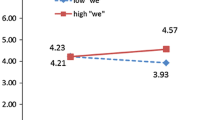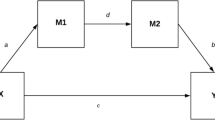Abstract
We investigated changes in negative affect reactions toward interpersonal duty violation/adherence under uncertainty which we refer to as uncertainty threat. One’s feelings of duty and obligation toward the partner may induce him/her to act in accordance to the partner’s expectations, and this functions to free the relationship of uncertainty. However, if the partner fails to conform to his/her duty, we may become uncertain about the future of the relationship, and consequently, experience negative affect, including anger, contempt, and disappointment. We hypothesized that uncertainty threat leads to such negative affective arousal. Uncertainty threat motivates individuals to reduce uncertainty, and hence make them more sensitive toward the source of uncertainty, above and beyond the specific context in which it poses a threat. A series of three experiments were conducted, in which we manipulated uncertainty threat through priming and a distractor task. Participants then read a short scenario in which duty violation or adherence were described, and rated negative affect toward it. Results generally indicated significant interaction effects across the experiments. The effects of scenario manipulation on negative affect reaction were more acute under uncertainty threat than when no threat was present. The present study indicated that duty was not only beneficial for social coordination, but also vital to mask uncertainty and insecurity regarding relationships.



Similar content being viewed by others
References
Bal, M., & Van den Bos, K. (2012). Blaming for a better future future orientation and associated intolerance of personal uncertainty lead to harsher reactions toward innocent victims. Personality and Social Psychology Bulletin, 38(7), 835–844.
Burgoon, J. K., & Hale, J. L. (1988). Nonverbal expectancy violations: Model elaboration and application to immediacy behaviors. Communication Monographs, 55(1), 58–79.
De Cremer, D., Brebels, L., & Sedikides, C. (2008). Being uncertain about what? Procedural fairness effects as a function of general uncertainty and belongingness uncertainty. Journal of Experimental Social Psychology, 44(6), 1520–1525.
Echebarria-Echabe, A. (2013). Mortality salience and uncertainty: Similar effects but different processes? European Journal of Social Psychology, 43(3), 185–191.
Greenberg, J., Pyszczynski, T., Solomon, S., Rosenblatt, A., Veeder, M., Kirkland, S., & Lyon, D. (1990). Evidence for terror management theory II: The effects of mortality salience on reactions to those who threaten or bolster the cultural worldview. Journal of Personality and Social Psychology, 58(2), 308.
Gudykunst, W. B. (1995). Anxiety/uncertainty management (AUM) theory: Current status. In R. L. Wiseman (Ed.), Intercultural communication theory (pp. 8–58). Newbury Park: Sage.
Hafer, C. L. (2000). Investment in long-term goals and commitment to just means drive the need to believe in a just world. Personality and Social Psychology Bulletin, 26, 1059–1073.
Hofstede, G., Hofstede, G. J., & Minkov, M. (2010). Cultures and organizations: software of the mind (3rd ed.). New York: McGraw-Hill.
Hogg, M. A., Sherman, D. K., Dierselhuis, J., Maitner, A. T., & Moffitt, G. (2007). Uncertainty, entitativity, and group identification. Journal of Experimental Social Psychology, 43(1), 135–142.
Holbrook, C., Sousa, P., & Hahn-Holbrook, J. (2011). Unconscious vigilance: Worldview defense without adaptations for terror, coalition, or uncertainty management. Journal of Personality and Social Psychology, 101(3), 451–466.
Kahneman, D. (2011). Thinking, fast and slow. New York: Farrar, Straus and Giroux.
Kawahito, J., Otsuka, Y., Kaida, K., & Nakata, A. (2011). Reliability and validity of the Japanese version of 20-item positive and negative affect schedule. Hiroshima Psychological Research, 11, 225–240.
Kulkarni, A., Anderson, W., Sanders, M. A., Newbold, J., & Martin, L. L. (2016). Manipulated flow reduces downstream defensiveness. The Journal of Positive Psychology, 11(1), 26–36.
Lerner, M. J. (1980). Belief in a just world: A fundamental delusion. New York: Plenum.
Markus, H. R., & Kitayama, S. (1991). Culture and the self: Implications for cognition, emotion, and motivation. Psychological Review, 98(2), 224–253.
Martin, L. L. (1999). ID compensation theory: Some implications of trying to satisfy immediate-return needs in a delayed-return culture. Psychological Inquiry, 10(3), 195–208.
McGregor, I., & Jordan, C. H. (2007). The mask of zeal: Low implicit self-esteem, threat, and defensive extremism. Self and Identity, 6(2–3), 223–237.
McGregor, I., Zanna, M. P., Holmes, J. G., & Spencer, S. J. (2001). Compensatory conviction in the face of personal uncertainty: going to extremes and being oneself. Journal of Personality and Social Psychology, 80(3), 472–488.
McGregor, I., Prentice, M. S., & Nash, K. A. (2009). Personal uncertainty management by reactive approach motivation. Psychological Inquiry, 20(4), 225–229.
McGregor, I., Nash, K., Mann, N., & Phills, C. E. (2010). Anxious uncertainty and reactive approach motivation (RAM). Journal of Personality and Social Psychology, 99(1), 133–147.
Moghaddam, F. M., Slocum, N. R., Finkel, N., Mor, T., & Harré, R. (2000). Toward a cultural theory of duties. Culture & Psychology, 6(3), 275–302.
Nash, K., McGregor, I., & Prentice, M. (2011). Threat and defense as goal regulation: from implicit goal conflict to anxious uncertainty, reactive approach motivation, and ideological extremism. Journal of Personality and Social Psychology, 101(6), 1291–1301.
North, D. C. (1981). Structure and change in economic history. New York: W. W. Norton & Company.
North, D. C. (2005). Understanding the process of economic change. Princeton, NJ: Princeton University Press.
Shteynberg, G., Gelfand, M. J., & Kim, K. (2009). Peering into the “magnum mysterium” of culture: the explanatory power of descriptive norms. Journal of Cross-Cultural Psychology, 40(1), 46–69.
Van den Bos, K. W., & Lind, E. A. (2013). The social psychology of fairness and the regulation of personal uncertainty. In R.M. Arkin, K.C. Oleson, & P.J. Carroll (Eds.), Handbook of the uncertain self (pp. 122–141). New York: Psychology Press.
Van den Bos, K., Poortvliet, P. M., Maas, M., Miedema, J., & Van den Ham, E. J. (2005). An enquiry concerning the principles of cultural norms and values: The impact of uncertainty and mortality salience on reactions to violations and bolstering of cultural worldviews. Journal of Experimental Social Psychology, 41(2), 91–113.
Van den Bos, K., Van Ameijde, J., & Van Gorp, H. (2006). On the psychology of religion: The role of personal uncertainty in religious worldview defense. Basic and Applied Social Psychology, 28(4), 333–341.
Van den Bos, K., Euwema, M. C., Poortvliet, P. M., & Maas, M. (2007). Uncertainty management and social issues: Uncertainty as an important determinant of reactions to socially deviating people. Journal of Applied Social Psychology, 37(8), 1726–1756.
Watson, D., Clark, L. A., & Tellegen, A. (1988). Development and validation of brief measures of positive and negative affect: the PANAS scales. Journal of Personality and Social Psychology, 54(6), 1063–1070.
Author information
Authors and Affiliations
Corresponding author
Ethics declarations
Human and animal rights
All procedures performed in studies involving human participants were in accordance with the ethical standards of the university research review committee of the affiliation of the authors, and with the 1964 Helsinki declaration and its later amendments or comparable ethical standards. All subjects were fully informed of the purpose of the experiment, upon which they consented to participate, and if they did, they were thoroughly advised of their rights as participants, and the experimental procedures before making their decision to participate.
Funding
This research was self-funded, conducted entirely on the initiative of the first author, and there was no funding from outside sources aside from the authors, and their university.
Conflict of interest
The authors declare that there was no conflict of interest in this research project.
Rights and permissions
About this article
Cite this article
Terashima, Y., Takai, J. Interpersonal Duty as a Tool for Managing Uncertainty: Uncertainty Threat Changes Negative Affect Reaction Toward Duty Adherence/Violation. Curr Psychol 38, 836–845 (2019). https://doi.org/10.1007/s12144-017-9660-2
Published:
Issue Date:
DOI: https://doi.org/10.1007/s12144-017-9660-2




